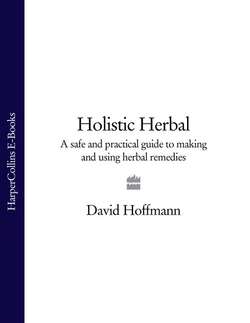Читать книгу Holistic Herbal: A Safe and Practical Guide to Making and Using Herbal Remedies - David Hoffmann - Страница 35
Prevention of respiratory disease
ОглавлениеWe are not only what we eat, but also what we breathe. Any problem with breathing will not only affect other organs and systems, but may well cause disease in these systems. However, as the body is a whole, the reverse is also true. When the lungs need to be treated, we also have to look at the circulatory system; much of what has been said about the heart and the circulation is relevant to the lungs. We should also look at the condition of the digestive system and especially of the organs of elimination, as the lungs share the role of removing waste with the bowels, the kidneys and the skin. If a problem develops in any of these systems, the body compensates by increasing the load on the others. There are limits to the amount of waste the lungs can put up with if, for instance, the bowels are clogged.
Most pathological changes in tissues can be prevented if the environmental milieu of the cells is constantly rich in oxygen. The amount of oxygen the circulation supplies to the tissue is largely controlled by respiration.
From all this it is apparent that the best preventative measures for this system are regular exercise and good breathing. While we take breathing for granted, conscious and proper breathing is regarded, even in orthodox medical circles, as invaluable. The central role of the breath in many spiritual paths should perhaps give us a clue here.
As with all disease, the best prophylactic is right lifestyle. Diet, exercise and quality of life all have a profound influence on the health of the lungs.
To ensure healthy lungs, the inner environment must be in harmony, and so also must be the outer environment. If the air we breathe is polluted it will disrupt the ecology of the lungs just as it disrupts the ecology of any forest. Air contaminated with chemicals and particles, gases and smoke, should be avoided. Which brings us to tobacco. Smoking puts a wall of tar and ash between the individual and the world so that a free ecological flow cannot take place in the lungs. This can lead to an impressive host of problems, from bronchitis to cancer, without taking into account all the effects of a diminished oxygen supply to the rest of the body. If we are to heal our selves and our world, here is a good place to start. Eating a whole food diet and living in the country pales a bit when faced with twenty cigarettes a day!
There are other specific dangers which can be recognised and avoided. In the case of infections, the simplest answer is to just avoid contact with it. However, as this is often socially impossible, we need to maintain our natural defences at their peak. A word is in place here about the questionable use of immunisation. The body, if given the chance, is capable of great feats of self-defence, as long as we provide a balanced, vitamin-rich diet in combination with a life style that is healthy in thought and feeling as much as in action. In this context it is vital to curb the misuse of antibiotics. While these drugs, used at the right time in the right way, can save lives, they can also reduce the innate defence systems of the body to impotence. In addition to the reduction of our defence, they also in the long run create—in an evolutionary sense—highly resistant bacteria, so that problems become more and more difficult to be treated. Over the last thirty years doctors have had to watch alarming developments in this direction. With correct life style and the use of herbal remedies when needed, antibiotics can often be avoided.
